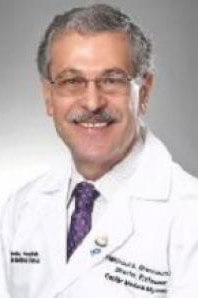Mahmoud Ghannoum, PhD

Mahmoud Ghannoum, PhD
Professor and Director, Center for Medical Mycology and
Mycology Reference Laboratory
Department of Dermatology
Case Western Reserve University
University Hospitals Case Medical Center
Dr. Mahmoud Ghannoum is the Marti D. and Jeffrey S. Davis Family Master Clinician in Cancer Innovation and Director of the Integrated Microbiome Core, A Cancer Resource Core and the Center for Medical Mycology at University Hospitals Cleveland Medical Center and Case Western Reserve University one of the top 24 medical research universities in the United States (according to US News & World Report).
Originally from Beirut, where he obtained his Bachelor of Science in Biology-Chemistry from the American University of Beirut, Dr. Ghannoum obtained his Master's degree in Medicinal Chemistry and PhD in Microbial Physiology in England, studying Candida, a species of fungi that, when allowed to grow uncontrolled, can cause Candidiasis the 3rd most common nosocomial infection afflicting millions of people worldwide.
Throughout his research career, Dr. Ghannoum established that fungal organisms constitute an essential part of the microbiome, his group published the first study describing the oral fungal microbiome of healthy individuals, wherein he gave the study of the fungal microscopic world its scientific name, the mycobiome (“myco” meaning fungus), now a standard reference term in the academic literature of mycology.
In 2016, Dr. Ghannoum discovered that harmful fungi and bacteria join forces to create intestinal biofilms. This matrix forms throughout our intestines, and very much like dental plaque, it serves to protect detrimental organisms hiding beneath the biofilm’s protective shield.
Numerous national and international awards validate Dr. Ghannoum’s renown including; NIH R01 grants, the coveted Bristol Myers Squibb Freedom to Discover Prize (for unrestricted research into infectious diseases), the prestigious Kuwait Foundation for Advancement of Science Award (a prize recognizing the most significant contributors to science across the Arab world), the Rhoda Benham Award, and the Billy Cooper Award from the Medical Mycological Societies of the Americas (for continuous outstanding contributions to medical mycology). His peers recognized him by electing him to become a Fellow of the American Academy of Microbiology and the European Confederation of Medical Mycology and the President of the Mycological Societies of the Americas. Mahmoud was also appointed as Chair of the Antifungal Sub-Committee of the Clinical and Laboratory Standards Institute. He has published over 400 peer-reviewed articles, edited and authored 37 book chapters and 6 books, has been awarded 4 patents and has been invited to give over 250 platform presentations around the world. This level of productivity was recognized by Dr. Ghannoum’s inclusion in the Stanford University list of the top 1 percent of the most-cited scientists, as well as among the top 0.1% microbiologists globally.
Dr. Ghannoum has raised both public and private funding on behalf of Case Western Reserve University and UH Cleveland Medical Center and initiated start-up companies through private investors and SBIR funding. He has been the recipient of SBIR Fast Track funding as well as private financing through angel investors, public funding sources (e.g. Jump Start), professional angels (e.g. North Coast Angels), and venture capital (Charter Life Science Fund). Dr. Ghannoum served as the Chief Scientific Officer and co-founder of Oasis Consumer Healthcare LLC/ARMS Pharmaceutical. A spin-off company that developed consumer antimicrobials and pharmaceutical infectious disease drugs. Dr. Ghannoum’s most recent venture centers on modulating the gut microbiota to improve gastrointestinal and overall wellness. Based on his research, Dr. Ghannoum aimed to rebalance and maintain the microbiota (both fungi and bacteria) using a probiotic and dietary approach. This work led to the founding of a company that developed a specific probiotic (BIOHM) capable of altering microbial biofilms, modulating the microbiome and alleviating gastrointestinal symptoms including abdominal pain, bloating, flatulence and constipation. In further support of this approach, Dr. Ghannoum recently published "Total Gut Balance", a consumer-facing book designed around the Mycobiome Diet, which was ranked among Amazon New releases as #1 in Physiology (Book) and #7 in Abdominal Disorders & Diseases (Books).


